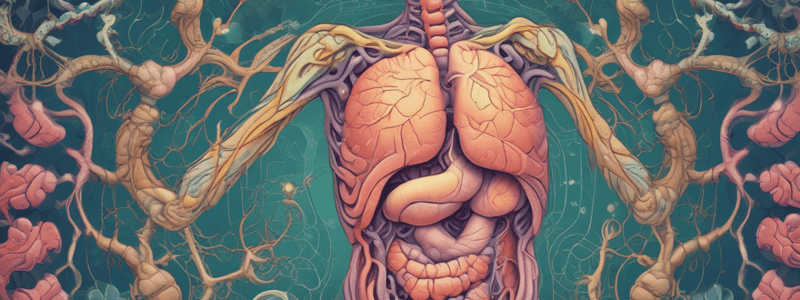Podcast
Questions and Answers
Match the gut hormone with its primary function:
Match the gut hormone with its primary function:
Gastrin = Stimulates the release of gastrin, hydrochloric acid, secretin, cholecystokinin, and glucagon Somatostatin = Stimulates the stomach to secrete gastric juice (hydrochloric acid and pepsin) Secretin = Inhibits the release of gastrin, hydrochloric acid, secretin, cholecystokinin, and glucagon Cholecystokinin (CCK) = Stimulates the pancreas to secrete bicarbonate
Match the gut hormone with its primary function:
Match the gut hormone with its primary function:
Fibroblast growth factor 19 (FGF19) = Enhance glucose-stimulated insulin secretion, increase glucose uptake by tissues Incretins (GLP-1 and GIP-1) = Stimulates glucose uptake and conversion to glycogen in the liver, synthesis of bile acids Ghrelin = Inhibits feeding, released by intestinal cells in response to feeding (especially protein-rich meals) Neuropeptide Y (NPY) = Stimulates bile secretion into the intestines, releases pancreatic digestive enzymes, and induces satiety
Match the gut hormone with its primary function:
Match the gut hormone with its primary function:
Peptide YY3-36 (PYY) = Stimulates the stomach to secrete gastric juice (hydrochloric acid and pepsin) Ghrelin = Secreted by the stomach when hungry; stimulates feeding by acting on the hypothalamus Neuropeptide Y (NPY) = Inhibits feeding, released by intestinal cells in response to feeding (especially protein-rich meals) Secretin = Stimulates the pancreas to secrete bicarbonate, which neutralizes intestinal contents and protects mucous membranes
Match the gut hormone with its primary function:
Match the gut hormone with its primary function:
Match the gut hormone with its primary function:
Match the gut hormone with its primary function:
Match the gut hormone with its primary function:
Match the gut hormone with its primary function:
Match the gut hormone with its primary function:
Match the gut hormone with its primary function:
Match the gut hormone with its primary function:
Match the gut hormone with its primary function:
Flashcards are hidden until you start studying
Study Notes
Gastrin
- Stimulates the stomach to secrete gastric juice, which consists of hydrochloric acid and pepsin.
Somatostatin
- Inhibits the release of gastrin, hydrochloric acid, secretin, cholecystokinin, and glucagon.
- Reduces the rate of digestion and nutrient absorption.
Secretin
- Stimulates the pancreas to secrete bicarbonate.
- Neutralizes intestinal contents and protects mucous membranes from stomach acid.
Cholecystokinin (CCK)
- Stimulates bile secretion into the intestines.
- Releases pancreatic digestive enzymes.
- Induces satiety by stimulating the vagus nerve.
Fibroblast Growth Factor 19 (FGF19)
- Stimulates glucose uptake and conversion to glycogen in the liver.
- Stimulates the synthesis of bile acids.
- Causes the gall bladder to relax and collect bile.
Incretins (GLP-1 and GIP-1)
- Enhance glucose-stimulated insulin secretion.
- Increase glucose uptake by tissues.
- Slow stomach emptying.
- Suppress glucagon secretion.
- Reduce appetite and food intake.
Ghrelin
- Secreted by the stomach when hungry.
- Stimulates feeding by acting on the hypothalamus.
Neuropeptide Y (NPY)
- Secreted by neurons in the hypothalamus.
- Potent stimulator of feeding.
Peptide YY3-36 (PYY)
- Inhibits feeding.
- Released by intestinal cells in response to feeding, especially protein-rich meals.
- Acts on the hypothalamus to suppress appetite.
- Stimulates bile release and pancreatic exocrine secretion.
Studying That Suits You
Use AI to generate personalized quizzes and flashcards to suit your learning preferences.




